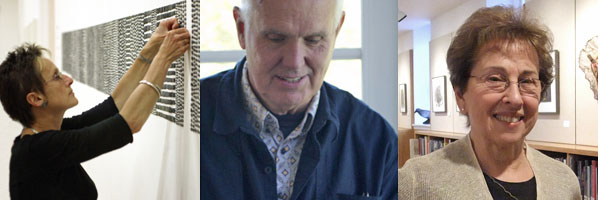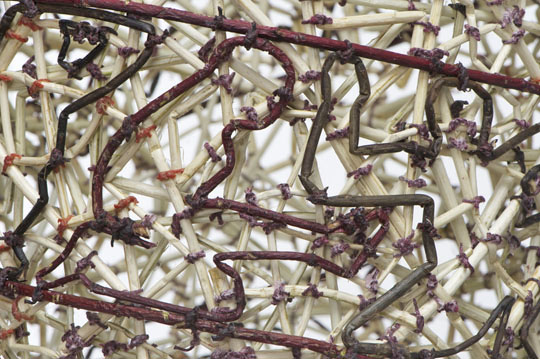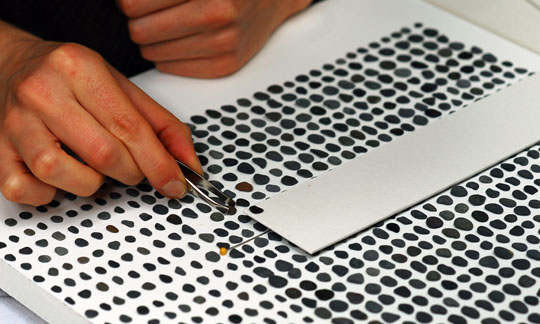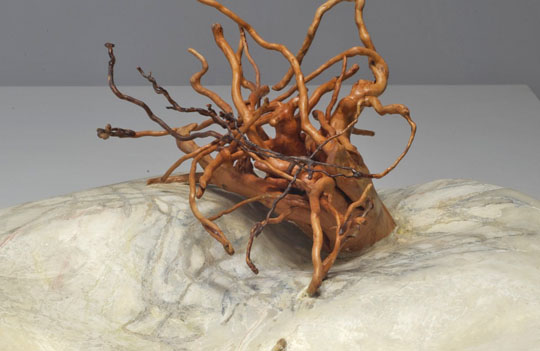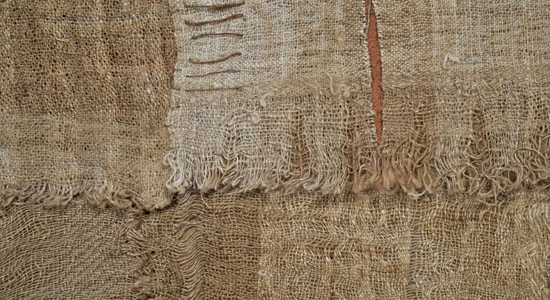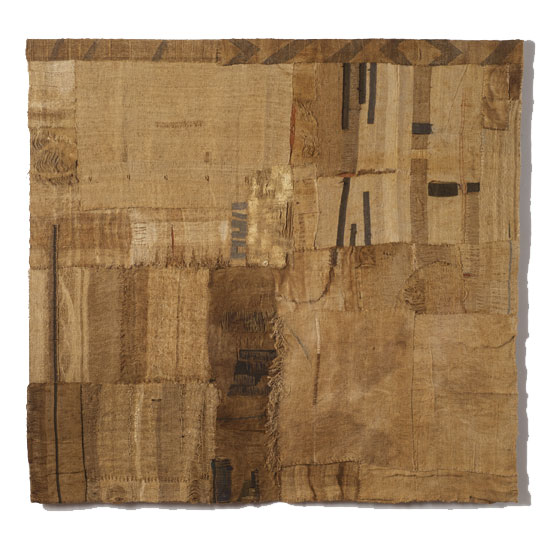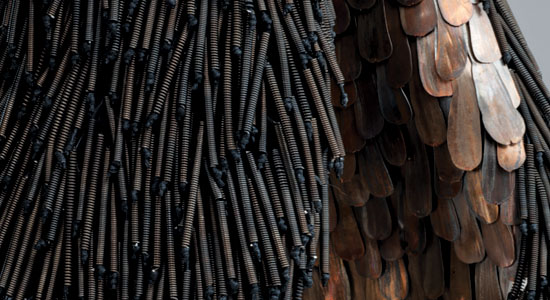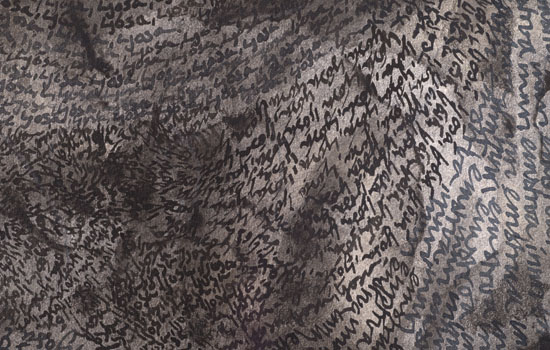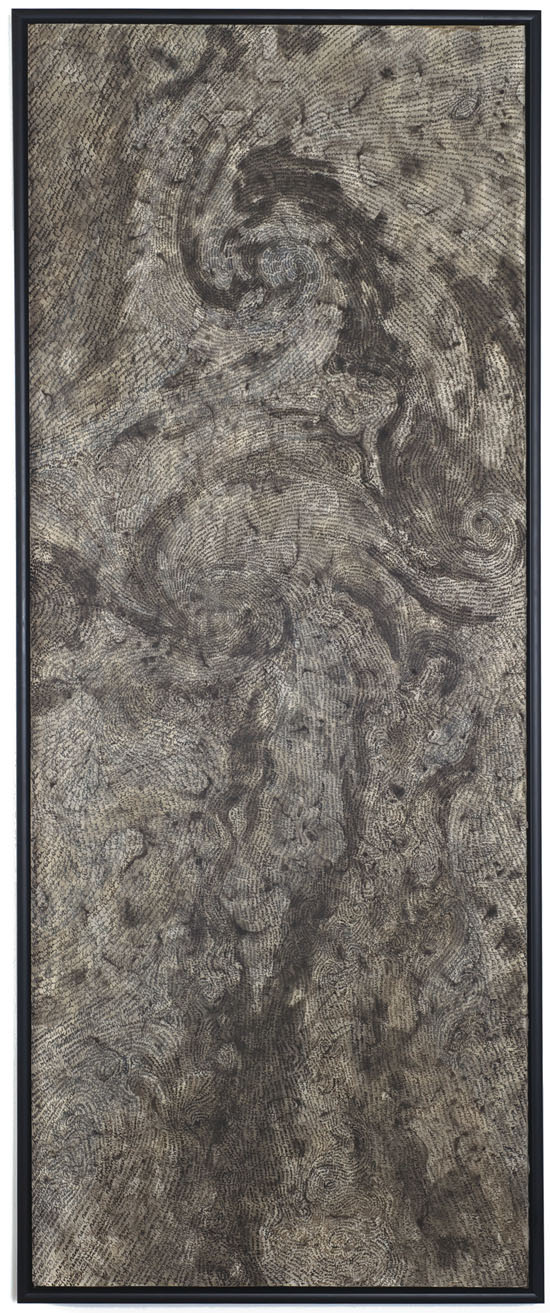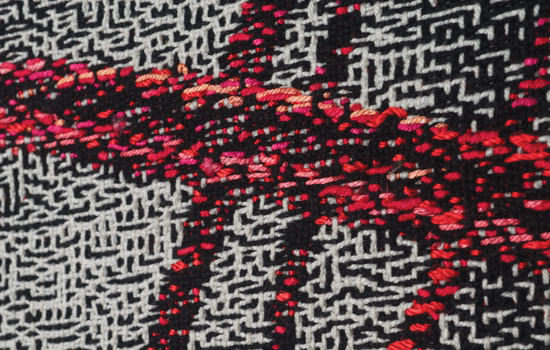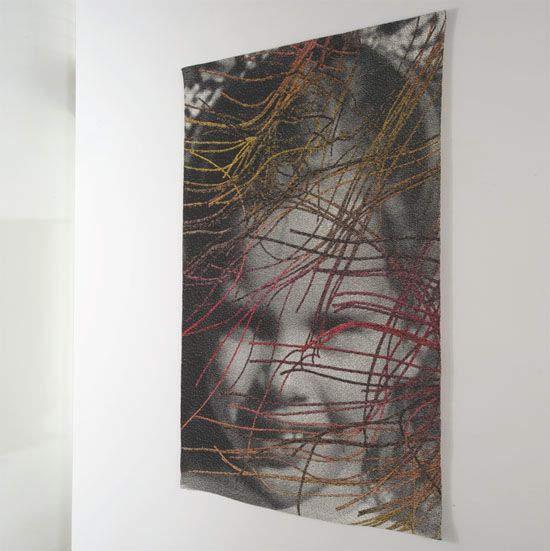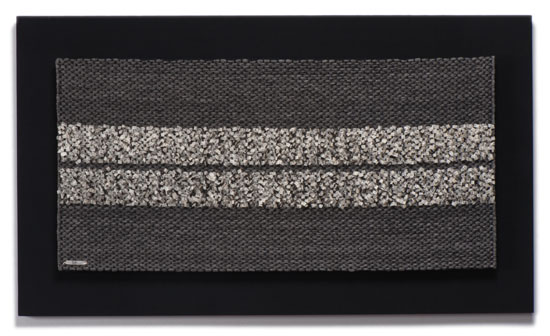
“We are living in the middle of the city pulse and are continuously overwhelmed by visual impressions and all kinds of information and on top of that we also very often have to make quick decisions. We all handle and cope with these issues in many different ways, but I do think we all need some quiet time – time for reflection to regain strength and energy in our daily lives,” says Swedish artist Eva Vargö, one of the 31 international artists whose work is included in Paperworks: material as medium, at the Flinn Gallery, Greenwich Library, which opens May 10th. Vargö deals with the life’s fast pace by weaving. “The working process is often repetitive and so it becomes meditative,” she says. “Mostly it gives me some peace of mind and my aim is to work at a slow pace. To be able to do one thing at a time without rush and to let go – to meet the unforeseen. I want to trust my intuition and my inner voice.” Vargö is a member of the International Association of Hand Papermakers and Paper Artists (IAPMA) and an Honorary Member of The Korean Paper Artists Association. Vargö’s husband was the Swedish Ambassador to Korea until last September and so she has spent considerable time in that country. Vargö’s work was included in last fall’s Swedish Contemporary Craft Art, at the Korean Foundation Cultural Center in Seoul, Korea. Her sophisticated weavings in Paperworks: material as medium incorporate old Korean book paper and ink-dyed paper string. The exhibition runs through June 21st. The opening reception is May 10th from 6 to 8 p.m.; there is a Curator’s Walkthrough on May 12th at 2 p.m. For more information contact the Flinn Gallery at (203) 622-7947.
Art News: Paperworks: material as medium — Eva Vargö
Art News: Paperworks: material as medium — Miriam Londoño
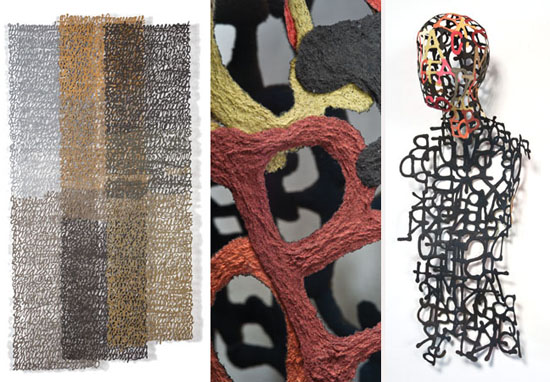 Miriam Londoño studied art at Antioquia University in Medelin, Colombia and at the Arts Academy in Florence, Italy. While she lived in Medelin, Londoño worked as an artistexplained the text from an exhibition earlier this year at Galerie 106 in the Netherlands.”The finished works hang on the wall as transparent paper strips with ornate characters and the words a shadow cast on the wall. The graceful play of light and dark contrasts with the emotional character of the stories described there. This paradox of light and shadow frequently reappear in her work.” Londoño’s work has been exhibited in the US, the UK, and Australia, Europe, Asia and South America. Two of Londoño’s works will be included in Paperworks: material as medium at the Flinn Gallery at he Greenwich Public Library, Greenwich, Connecticut from May 10th through June 21st, curated by Kelly Eberly and Barbara Richards and browngrotta arts. The Flinn Gallery is in the Greenwich Library, 101 West Putnam Avenue, Greenwich, CT 06830. For more information call: 203.622.7947.
Miriam Londoño studied art at Antioquia University in Medelin, Colombia and at the Arts Academy in Florence, Italy. While she lived in Medelin, Londoño worked as an artistexplained the text from an exhibition earlier this year at Galerie 106 in the Netherlands.”The finished works hang on the wall as transparent paper strips with ornate characters and the words a shadow cast on the wall. The graceful play of light and dark contrasts with the emotional character of the stories described there. This paradox of light and shadow frequently reappear in her work.” Londoño’s work has been exhibited in the US, the UK, and Australia, Europe, Asia and South America. Two of Londoño’s works will be included in Paperworks: material as medium at the Flinn Gallery at he Greenwich Public Library, Greenwich, Connecticut from May 10th through June 21st, curated by Kelly Eberly and Barbara Richards and browngrotta arts. The Flinn Gallery is in the Greenwich Library, 101 West Putnam Avenue, Greenwich, CT 06830. For more information call: 203.622.7947.
Art News: Paperworks: material as medium — Takaaki Tanaka
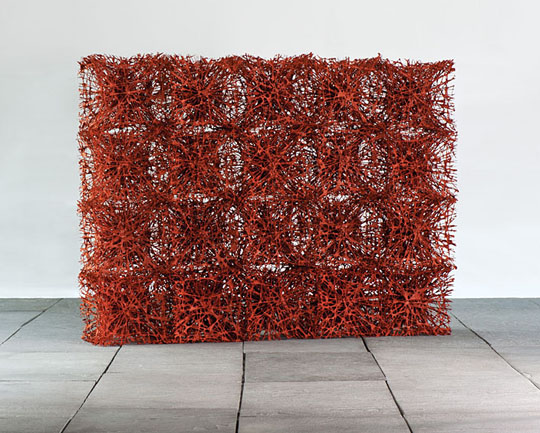 Visitors to Paperworks: medium as message at the Flinn Gallery, at the Greenwich Public Library (May 10th – June 21st) will see Takaaki Tanaka’s show-stopping work, A Hardened Nest, at the entrance to the exhibition. A Hardened Nest was created by arranging threads tightly in space and then covering these threads with a paper fiber mixture which, once dried, hold its given shape in space. Combining prepared units, the artist has built a substantial wall of what he refers to as “nests,” which, he notes, are a fundamental starting point for many species of animal life. “I am interested in the way that fiber made from paper, a material harvested from plants, can take on a completely different aspect when it hardens to form a new shape inspired by the natural world,” says Tanaka. “The shapes become emotional shapes,” he says, that illustrate themes of nature, sense of touch and communication.” Tanaka’s work was featured in the exhibition and catalog for Fiber Futures: Japan’s Textile Pioneers at the Japan Society in New York 2011.
Visitors to Paperworks: medium as message at the Flinn Gallery, at the Greenwich Public Library (May 10th – June 21st) will see Takaaki Tanaka’s show-stopping work, A Hardened Nest, at the entrance to the exhibition. A Hardened Nest was created by arranging threads tightly in space and then covering these threads with a paper fiber mixture which, once dried, hold its given shape in space. Combining prepared units, the artist has built a substantial wall of what he refers to as “nests,” which, he notes, are a fundamental starting point for many species of animal life. “I am interested in the way that fiber made from paper, a material harvested from plants, can take on a completely different aspect when it hardens to form a new shape inspired by the natural world,” says Tanaka. “The shapes become emotional shapes,” he says, that illustrate themes of nature, sense of touch and communication.” Tanaka’s work was featured in the exhibition and catalog for Fiber Futures: Japan’s Textile Pioneers at the Japan Society in New York 2011.
Exhibition News: Paperworks: material as medium opens in Greenwich on May 10th
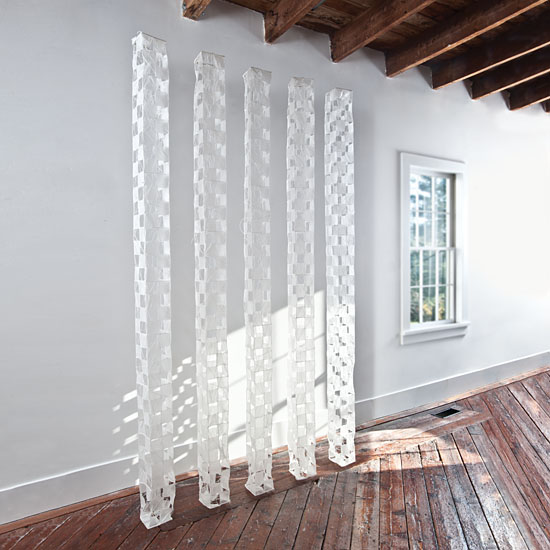
UNTITLED, Naomi Kobayashi, kayori thread, paper, 99″ x 54″ x 5″, 2006, photo by Tom Grotta, courtesy of browngrotta arts
Paper holds a powerful place in the history of human interaction, marking our milestones with birth certificates, marriage licenses and diplomas, maintaining our collective Paperworks: material as medium at the Flinn Gallery at the Greenwich Public Library, Greenwich, Connecticut from May 10th through June 21st, curated by Kelly Eberly and Barbara Richards and browngrotta arts, celebrates paper in another guise – as a medium for art.
The work of more than 30 international artists inspired by and created from paper is featured in Paperworks. In them, paper has been stitched and plaited, carved and stacked, used as pulp to be molded and reformed, while newspapers, telephone books and dress patterns have been repurposed as vessels and sculpture. The artists in Paperworks treat varieties of paper their material as others would wood, linen, clay or marble.
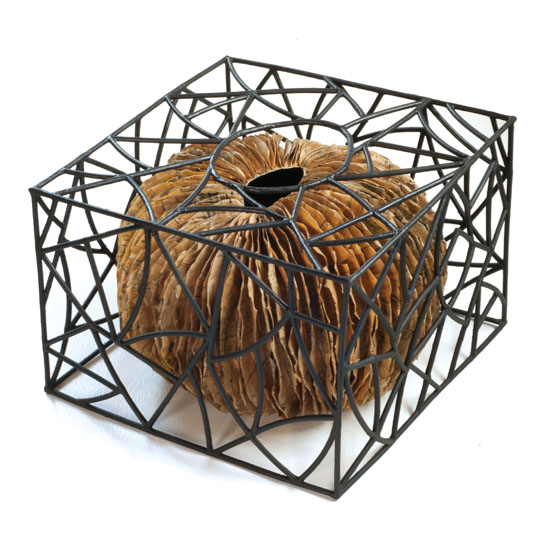
OVER EASY, Dona Anderson, paper armature covered with pattern paper as surface design. Frame (cover) is rounds reeds strengthened with pattern paper, polymer and black paint 10″ x 14″ x 14″ , 2011. photo by Tom Grotta, courtesy of browngrotta arts
Several of the artists in Paperworks create structures of recycled papers. Wendy Wahl of the US uses pages of old encyclopedias to create an arbor of arches while Kazue Honma of Japan creates vessels from Japanese telephone books and Japanese artist Toshio Sekiji weaves wallworks newspapers from around the world. The exhibition includes constructions by the late US artist Ed Rossbach made of cardboard and newpaper and vessels made of dress pattern paper by US artist Dona Anderson.
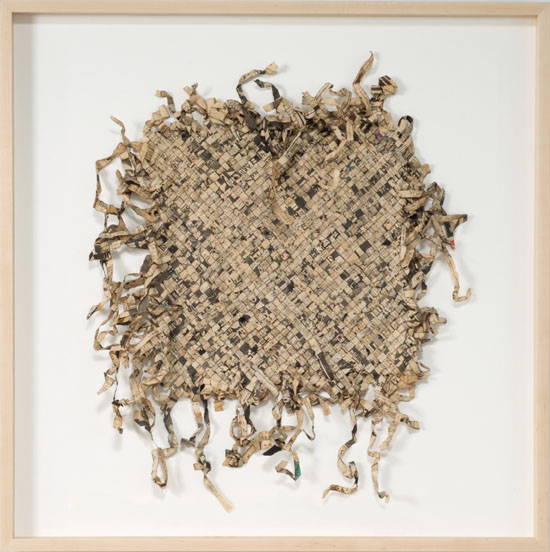
34ts COUNTERPOINT 8, Toshio Sekiji, Korean newspapers; black urushi lacquer 28″ x 25″ x 4″, 2009, photo by Tom Grotta, courtesy of browngrotta arts
For Jane Balsgaard of Denmark, Naomi Kobayashi of Japan and Pat Campbell and Mary Merkel-Hess of the US, handmade and gampi paper create semi-translucent, ethereal objects that seem capable of floating. In Balsgaard’s case, the paper she uses is made from materials gathered near her summer home in Sweden. Mary Merkel-Hess uses gampi paper, papier-maiche and reed to create baskets, softly lit sculptures and wall works. Other artists, including Sylvia Seventy from the US, use molded paper pulp to create art, including in Seventy’s case, molded paper bowls populated with found and other objects.
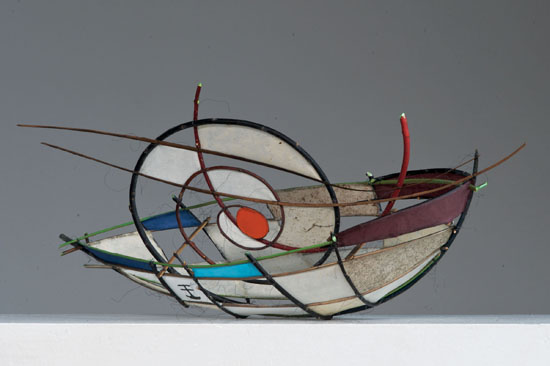
brazilian palm, banana leaves, morbærbark paper, 11″ x 24″ x 9.5″, 2010, photo by Tom Grotta, courtesy of browngrotta arts
In conjunction with Paperworks: material as medium there will be a Curator’s Walkthrough on May 12th at 2 p.m. and an Artist’s Talk by artist Wendy Wahl on June 10th at 2 p.m. The Flinn Gallery is in the Greenwich Library, 101 West Putnam Avenue, Greenwich, CT 06830. An opening reception will be held May 10th from 6-8. For more information call: 203.622.7947.
Upcoming: Events at SOFA New York this Week
Lectures, artist booth visits and more. This week’s events include:
April 19th
Opening – SOFA NY
April 20th
1 p.m. to 2 p.m.
Artist booth visit
John McQueen
browngrotta arts booth 208
April 21st
1 p.m. to 2 p.m.
Artist booth visit Norma Minkowitz
25 at 25 at SOFA NY Countdown: Anda Klancic
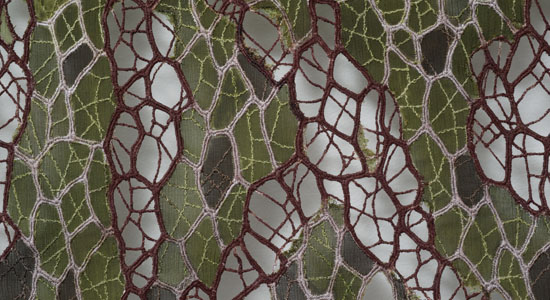
Anda Klancic, Black Grove detail, photo by Tom Grotta
Cerni Goj means the black grove in the ancient Slovenian language, but it is also a surname in Slovenia, the name of the late Slovenian painter and graphic artist, August Cernigoj. At SOFA NY 2012 , browngrotta arts will exhibit Anda Klancic’s work, The Black Grove. The work involved several techniques and manipulations, took 13 years to complete and explores the themes of global linkage and the interaction of humans and nature.
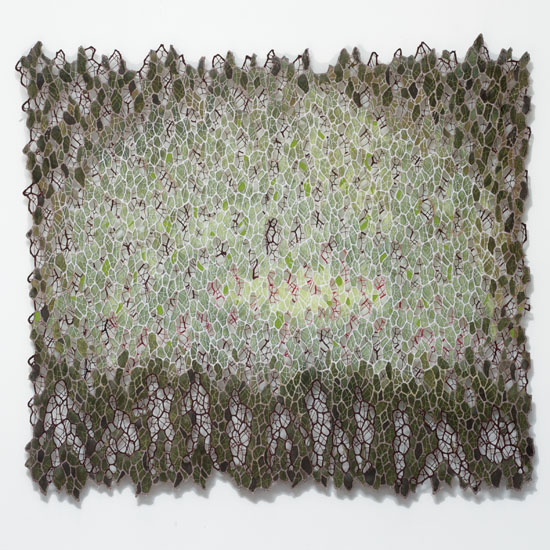 Klancic’s first stimulus for The Black Grove was the structure of the vein-like net of the dried fruit from the plant echynocystis lobata, a wild pumpkin. Inspired by this natural structure, Klancic designed a pattern for industrial machine-embroidered lace and machine-embroidered fabric. From a piece of this embroidered fabric, produced from selected raw materials especially for this hand-manipulated experiment, she produced The Black Grove, using numerous hand-applied techniques.
Klancic’s first stimulus for The Black Grove was the structure of the vein-like net of the dried fruit from the plant echynocystis lobata, a wild pumpkin. Inspired by this natural structure, Klancic designed a pattern for industrial machine-embroidered lace and machine-embroidered fabric. From a piece of this embroidered fabric, produced from selected raw materials especially for this hand-manipulated experiment, she produced The Black Grove, using numerous hand-applied techniques.
Klancic’s work has garnered international acclaim. Her three-dimensional lace work, Foothpaths 2, was commended by the judges at last year’s International Triennial of Tapestry in Poland. Her lighted works Aura and Aura F&M, were presented at the Miniartextil Energheia touring exhibition that opened in Milan, Italy. Aura which is made of palm tree bark, optical fibre, and includes three halogen light sources, is currently in Zagreb, Croatia in the Textil{e}tronic exhibition.
25 at 25 at SOFA NY Countdown: Susie Gillespie
25 at 25 at SOFA NY Countdown: Mary Giles
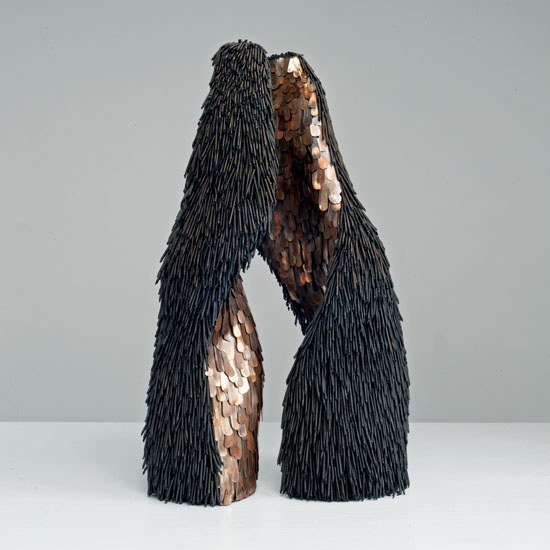
53mg TWIST, Mary Giles, waxed linen, iron twists, and hammered tin coated copper wire, 22″ x 10″ x 5″, 2012, photo by Tom Grotta
Mary Giles‘ sculptures, Sentry Field and Twist, made of knotted linen, pressed metal and springs, will be on display at browngrotta arts at SOFA 2012 , booth 208. Giles says of her work, “I interpret and express my concerns about our environment and the human condition through my work. I have also explored themes related to communication and intimacy in relationships, and the results are reflected in my figural work. Today, however, I am very concerned about the environment and try to capture the forms, textures, and light found in nature. I admire the directness and honesty I see in tribal art, and I try to incorporate those qualities in my own.” Giles’ work is in numerous museum collections including that of the Museum of Arts and Design in New York, the Detroit Institute of Arts, the St. Louis Art Museum and the Minneapolis Institute of Arts.
25 at 25 at SOFA NY Countdown: Chris Drury
Chris Drury’s Crossing and Re-crossing the Rivers of Iceland will be exhibited by browngrotta arts at SOFA NY 2012. The handwritten text on the peat-impregnated paper lists and repeats all the rivers crossed on a six- day walk from Porsmork to Landmanalauga in Iceland. The pattern is from a satellite image of a storm that hit us on the fourth day. The story behind Crossing and Re-crossing the Rivers of Iceland Drury and a friend with a heart condition, went on a six-day walk in central Iceland. On the fourth day they were hit by a storm and waited out the night in a hut. The following day, the storm was still raging but they used a four-hour lull to try and catch their plane. They started for the next hut at 3:00 p.m., crossing a cold river and climbing 2000 feet to a snow-covered plateau. On the top the storm returned and they were enveloped in a whiteout.
Drury’s friend announced that he wasn’t going to make it to the hut. He was, in fact, having a heart attack. Drury didn’t know it, but his heart was shutting down. He gave him some water, which he used to swallow pills given him by his doctor for just such an emergency. The pills saved his life and he was able to make it to the hut. This experience is reflected in Crossing and Re-crossing the Rivers of Iceland. The blood flows in the heart in a double vortex pattern called a Cardiac Twist; the storm that Drury and his friend were caught in had that same pattern. Drury is an environmental artist who has created site-specific works from South Africa to Ireland to Wyoming. In recent years he has studied systems in the body and on the planet, with particular reference to systems of blood flow in the heart, including combining measurements of the “Earth’s heartbeat,” echograms of Antarctica, with the heartbeat, echocardiogram, of a pilot who flies there in his work, Double Echo. Drury’s work has been included in several books, including Chris Drury: Found Moments in Time and Space (Harry N. Abrams, Inc.).
25 at 25 at SOFA NY Countdown: Lia Cook
At SOFA NY 2012, browngrotta arts‘ display will include Neural Networks by Lia Cook. Cook works in a variety of media, combining weaving with painting, photography, video and digital technology. Cook’s current practice explores the sensuality of the woven image and the emotional connections to memories of touch and cloth. Working in collaboration with neuroscientists at the University of Pittsburg School of Medicine,
Cook has investigated the nature of the emotional response to woven faces by mapping in the brain these responses and using the laboratory experience both with process and tools to stimulate her work in reaction to these investigations. Her solo exhibition, Bridge 11: Lia Cook, which includes large-scale woven images of human faces and introduces several works based on her recent art-neuroscience collaboration, is at the Houston Center for Contemporary Craft through May 13th. Cook is one of 11 artists whose work is highlighted in the current exhibition, Sourcing the Museum, at the Textile Museum in Washington, DC through August 19th and one of 14 artists featured in Sleight of Hand at the Denver Art Museum through May 13th.
Search
Subscribe2
Recent Posts
- February 18, 2026
- February 11, 2026
- February 4, 2026
Pages
blogroll
Archives
- February 2026
- January 2026
- December 2025
- November 2025
- October 2025
- September 2025
- August 2025
- July 2025
- June 2025
- May 2025
- April 2025
- March 2025
- February 2025
- January 2025
- December 2024
- November 2024
- October 2024
- September 2024
- August 2024
- July 2024
- June 2024
- May 2024
- April 2024
- March 2024
- February 2024
- January 2024
- December 2023
- November 2023
- October 2023
- September 2023
- August 2023
- July 2023
- June 2023
- May 2023
- April 2023
- March 2023
- February 2023
- January 2023
- December 2022
- November 2022
- October 2022
- September 2022
- August 2022
- July 2022
- June 2022
- May 2022
- April 2022
- March 2022
- February 2022
- January 2022
- December 2021
- November 2021
- October 2021
- September 2021
- August 2021
- July 2021
- June 2021
- May 2021
- April 2021
- March 2021
- February 2021
- January 2021
- December 2020
- November 2020
- October 2020
- September 2020
- August 2020
- July 2020
- June 2020
- May 2020
- April 2020
- March 2020
- February 2020
- January 2020
- December 2019
- November 2019
- October 2019
- September 2019
- August 2019
- July 2019
- June 2019
- May 2019
- April 2019
- March 2019
- February 2019
- January 2019
- December 2018
- November 2018
- October 2018
- September 2018
- August 2018
- July 2018
- June 2018
- May 2018
- April 2018
- March 2018
- February 2018
- January 2018
- December 2017
- November 2017
- October 2017
- September 2017
- August 2017
- July 2017
- June 2017
- May 2017
- April 2017
- March 2017
- February 2017
- January 2017
- December 2016
- November 2016
- October 2016
- September 2016
- August 2016
- June 2016
- April 2016
- March 2016
- February 2016
- December 2015
- October 2015
- September 2015
- August 2015
- June 2015
- May 2015
- April 2015
- March 2015
- February 2015
- January 2015
- December 2014
- November 2014
- October 2014
- September 2014
- August 2014
- July 2014
- June 2014
- May 2014
- April 2014
- March 2014
- February 2014
- January 2014
- December 2013
- October 2013
- September 2013
- July 2013
- June 2013
- May 2013
- April 2013
- March 2013
- January 2013
- December 2012
- November 2012
- October 2012
- September 2012
- August 2012
- July 2012
- June 2012
- May 2012
- April 2012
- March 2012
- February 2012
- January 2012
- December 2011
- November 2011
- October 2011
- September 2011
- August 2011
- July 2011
- June 2011
- May 2011
- April 2011
- March 2011
- February 2011
- January 2011
- December 2010
- November 2010
- October 2010
- September 2010
- August 2010
- July 2010
- June 2010
- May 2010
- April 2010
- March 2010
- February 2010
- January 2010
- December 2009
- November 2009
- October 2009
- September 2009
- August 2009
Categories
- Acquisitions
- Aldrich Museum of Contemporary Art
- Allies for Art
- An Unexpected Approach
- Anniversary
- Architecture
- Art
- art + identity
- Art Assembled
- Art Materials
- art money
- Art Preview
- Art Textiles
- artist
- Artsy
- Awards
- bamboo
- Basketmakers
- Basketry
- Behind the Scenes
- Blue/Green
- Book Recommendations
- Books
- Catalogs
- Ceramics
- Charity
- Classes
- Collage
- Collectors
- Commentary
- Commission
- Commissions
- Danish Tapestry
- DIY
- Eco-Art
- Exhibitions
- Fashion
- Fiber Future
- Fiber Sculpture
- Film
- Galleries
- Gifts
- Guest Post
- History
- In the News
- Installations
- Japandi
- Japanese Art
- Japanese Ceramics
- Lectures
- Mixed Media
- Museums
- New This Week
- New York
- Obituary
- Obiturary
- Outdoors
- Paper
- Philadephia Museum of Art
- Photography
- Politics
- Pop-Up Exhibition
- Press
- Process Notes
- Sculpture
- SOFA
- Sweepstakes
- Tapestry
- tate modern
- Technology
- Text Art
- Travel
- Uncategorized
- Volume 50: Chronicling Fiber Art for Three Decades
- White
- White Art
- Who Said What
- Wood
- Workshops
Tags
Adela Akers art assembled browngrotta arts Carolina Yrarrázaval Caroline Bartlett Dorothy Gill Barnes Ed Rossbach Gyöngy Laky Heidrun Schimmel Helena Hernmarck Hisako Sekijima James Bassler Jane Balsgaard Jennifer Falck Linssen Jin-Sook So Jiro Yonezawa John McQueen Judy Mulford Karyl Sisson Kay Sekimachi Kiyomi Iwata Kyoko KumaI Lawrence LaBianca Lenore Tawney Lewis Knauss Lia Cook Magdalena Abakanowicz Marian Bijlenga Mariette Rousseau-Vermette Mary Giles Mary Merkel-Hess Nancy Koenigsberg Nancy Moore Bess Naoko Serino Naomi Kobayashi Norma Minkowitz Rachel Max Randy Walker Sheila Hicks Sheila hicks Stéphanie Jacques Sue Lawty Tapestry Wendy Wahl Yasuhisa KohyamaAbout browngrotta.com
blogroll
reboot
site-ings
who's showing where
Subscribe
Pages
Archives
Calendar

